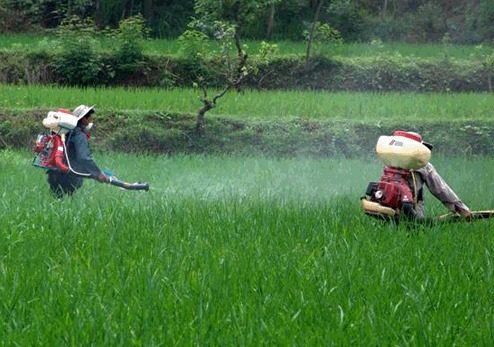In the Glyphosate China Monthly Report 1607,
CCM analyzed three disorder phenomena in China's sterilant herbicide market
following China's ban on paraquat AS on 1 July, 2016 – price wars in the
paraquat substitute market; difficulty for farmers and distributors in choosing
substitutes for paraquat AS; fake and inferior substitutes flowing into the
market. Recently, another phenomenon
has been found, namely that some diquat AS sold on the market had actually been
paraquat AS.

Source: Baidu
On 8 Aug., 2016, the Shandong Institute for
the Control of Agrochemicals (SICA) reported that it had detected paraquat in
samples of diquat in Shandong Province, a large paraquat-producing region in
China. Specifically, the paraquat content in three kinds of diquat 200 g/L AS
was 22.50%, 9.40%, 20.70% respectively. In other words, the sampled diquat AS
was actually paraquat 20% AS. In addition, paraquat and industrial waste
sulfuric acid were also found to have been added to some glyphosate sold on the
market.
The SICA speculated that this was mainly
because:
1. Enterprises that produce paraquat AS for
export added paraquat to diquat to sell on the domestic market for profit.
2. In order to reduce losses, after
paraquat AS was banned, paraquat manufacturers pulled unsold paraquat AS from stores,
repackaged it, and then sold it as diquat AS on the market.
3. Diquat enterprises added paraquat to
their products to reduce production costs and increase product efficacy.
4. Unlicensed enterprises illegally produce
fake and inferior diquat for higher profit.

The SICA is paying close attention to this
phenomenon and announced four major measures to prevent it:
-
Enterprises who sell export-oriented
paraquat AS on the domestic market, use paraquat to simulate diquat, or add
paraquat to diquat, will be punished by the Ministry of Agriculture of the
People's Republic of China (MOA) and police departments
-
Law enforcement departments will secure
paraquat inventories and offer opinions on disposal
-
The SICA will confiscate fake and inferior
diquat and apply for funding to safely dispose of it; if a large quantity of
products are confiscated and have no quality issues, designated reserve units
for highly toxic pesticides will dispose of them efficiently as soon as
possible according to highly toxic pesticide control regulations, after
approval from the MOA
-
The SICA will strengthen the supervision on
glyphosate sold on the market, and increase the detection index for sulfuric
acid. If any problems are found, the SICA will timely inform the province and
take action
It is hard to know whether the above
phenomenon is occurring in other provinces/ municipalities. There has been no
similar reported circumstance of this in Jiangsu Province, another large
paraquat-producing region in China.
This article comes from Glyphosate China Monthly Report 1608, CCM

About CCM:
CCM is the leading market intelligence provider for China’s
agriculture, chemicals, food & ingredients and life science markets. Founded in 2001, CCM offers a
range of data and content solutions, from price and trade data to industry
newsletters and customized market research reports. Our clients include Monsanto,
DuPont, Shell, Bayer, and Syngenta. CCM is a brand of Kcomber Inc.
For more information about CCM, please visit www.cnchemicals.com or get in touch with us
directly by emailing econtact@cnchemicals.com or calling
+86-20-37616606.
Tag: paraquat glyphosate